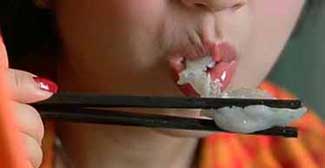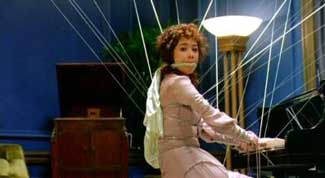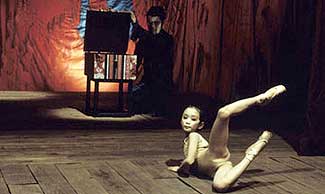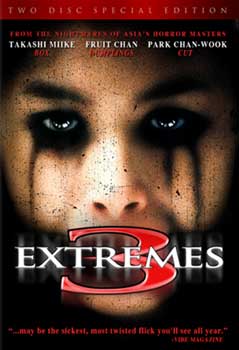The anthology disc Three Extremes (Saam gaang yi, 2004) presents three short horror films from three Asian horror directors, one each from Hong Kong, Korea, & Japan.
 First out of the gate is by the least known director, Fruit Chan. Dumplings features creepy cook Aunt Mei (Bai Ling) who makes very special dumplings or potstickers with meat good for health, perfect skin, & restoration of youth. First out of the gate is by the least known director, Fruit Chan. Dumplings features creepy cook Aunt Mei (Bai Ling) who makes very special dumplings or potstickers with meat good for health, perfect skin, & restoration of youth.
But is the rejuvenating meat secretly made from human festuses? You bet. Because mostly only girls get aborted, male premies are rare, the most expensive, & make the most potent dumplings. One beautifully grotesque scene with an abortionist shows a male premie plopping out to be used for the steamed dumpling meat.
This sicko little idea for a featurette would seem ready-made to turn out as trivial as just about any random episode of Tales from the Crypt. But the tale, written by Lilian Lee, as acted out by fine actresses, has a definite feminist tone. And certainly feminist gore-horror is a rare thing worthy of some attention, even if said tale is indeed ultimately trivial.
Mrs. Li (Miriam Yeung) wants to regain her youth for fear of her husband (Tony Leung) having become so distant, & she suspects him of cheating. Kate (Miki Yeung) is typical victim of the abortions, bleeding to death in the street, so that matrons like Mrs. Li can regain radiant youth.
The side-effects to Mrs. Li's rejuvination after injestion of the male incest-premie are headaches, ichy rash, & a fishy stench exuding from her body. Then she discovers she is pregnant for the first time, though long barron. Will it make good dumplings?
An extended version of Dumplings (Gaau ji, 2006) did not strike me as worth tracking down since the short version was only so-so.
The second tale Cut is directed by Park Chan-wook, director of a brilliant revenge trilogy that began with Oldboy (2003).
 A beautiful female vampire (Yum Jung-ah) is feasting at the neck of a victim who stands paralysed in a living room. A beautiful female vampire (Yum Jung-ah) is feasting at the neck of a victim who stands paralysed in a living room.
This turns out to be a movie set with a gross scene being filmed, but nothing bad actually happening.
The fictional director (Lee Byung-hun) goes home after a long day of shoots. It turns out the film set was based on his own place, so going home is like staying on the set, which saves on the budget for the short film we're watching.
The electricity suddenly goes out & there's someone present. A psycho (Lim Won-hie) captures him & ties him up like a dog, & ties up his wife like a marionette at her piano.
The psycho arranges an elaborate scheme of torture, sometimes funny, always demented. The big joke is the tortured director is at base a good man & the psycho resents his decency. The anguished director says, "I'm sorry for being a good man!"
It's well acted but not very interesting for more than being anal. Chopping fingers off one by one destroying the ability for the pianist wife (Kang Hye-jeong) ever to play again is the biggest event of the tale, & forcing the director to kill an innocent child.
A grizzly conclusion is just so ridiculous it's funny, with a couple wacky fillips after the main climax giving it extra oomph, though it remains basically stupid.
The third short film Box is by the most important director of the three, Takeshi Miike. The bar isn't high for the most important director of three also making the best film, but fact is, Box is a brilliant work of art, such as the other two featurettes can't approach.
 Kyoko, a novelist, is haunted by her sister Shoko (Kyoko Hasegawa plays both roles as an adult; as kids, Mai Suzuki is Kyoko, Yuu Suzuki is Shoko). Kyoko, a novelist, is haunted by her sister Shoko (Kyoko Hasegawa plays both roles as an adult; as kids, Mai Suzuki is Kyoko, Yuu Suzuki is Shoko).
When they were little, they were part of their father's magic act in a circus bigtop. They were central to a trick requiring the girls to be locked in boxes which were almost too small for them to fold up within.
The father (Atsuro Watabe who also plays Kyoko's publishing house editor) played favorites with his daughter. Shoko had been more "privileged" & rewarded for her talents, while Kyoko was ignored.
Objectively the girls were identical twins & totally equal & their father's imbalanced treatment of them had no real justification, except to make Kyoko jealous. But Kyoko should never have been envious since life was actually horrific for her sister, who had also to fulfill the roles of wife & lover, even though she was only ten years old.
How Shoko died is wonderfully monstrous, mostly an accident after Kyoko locked her in one of the boxes. Ever since then, boxes have induced Kyoko's nightmares, & even a gift of an innocent music box can send her into steep decline.
Stunning cinematography renders this film symbolic in its power, more beautiful than it is horrific. The dream of Kyoko being folded up like a marionette, wrapped in plastic, placed in a box, & buried deep beneath the snow is like a poem of terror, with many images that could each one have been a classic surrealist painting.
The father's twisted incestuous gentleness is creepier than any other horror element of the film, & Kyoko's eventual responsiveness psychologically appalling. The denoument is a great marvel. Miike has truly created something remarkable.
copyright © by Paghat the Ratgirl
|

 First out of the gate is by the least known director, Fruit Chan. Dumplings features creepy cook Aunt Mei (Bai Ling) who makes very special dumplings or potstickers with meat good for health, perfect skin, & restoration of youth.
First out of the gate is by the least known director, Fruit Chan. Dumplings features creepy cook Aunt Mei (Bai Ling) who makes very special dumplings or potstickers with meat good for health, perfect skin, & restoration of youth. A beautiful female vampire (Yum Jung-ah) is feasting at the neck of a victim who stands paralysed in a living room.
A beautiful female vampire (Yum Jung-ah) is feasting at the neck of a victim who stands paralysed in a living room. Kyoko, a novelist, is haunted by her sister Shoko (Kyoko Hasegawa plays both roles as an adult; as kids, Mai Suzuki is Kyoko, Yuu Suzuki is Shoko).
Kyoko, a novelist, is haunted by her sister Shoko (Kyoko Hasegawa plays both roles as an adult; as kids, Mai Suzuki is Kyoko, Yuu Suzuki is Shoko).